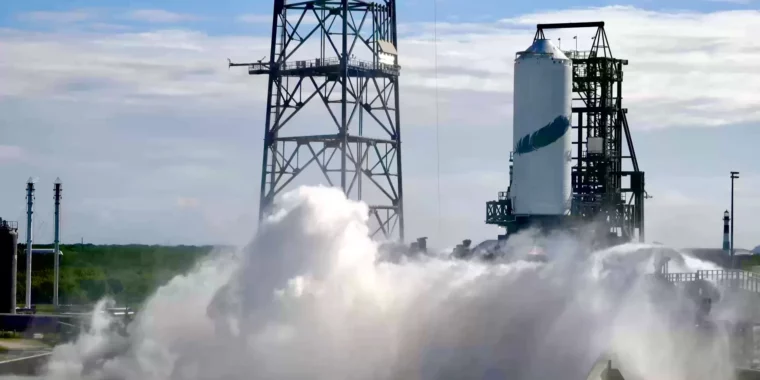Blue Origin
Twenty days after departing for Blue Origin’s launch site in Florida, the second stage of the giant New Glenn rocket successfully completed a hot-fire test on Monday.
The second stage (GS2, Glenn Stage 2) was ignited for 15 seconds as part of a “risk reduction” hot-fire test. The companyFueled by liquid oxygen and hydrogen, the twin BE-3U engines, each producing 173,000 pounds of thrust, burned with almost clear flames at temperatures approaching 6,000 degrees Fahrenheit.
It was the first time that Blue Origin, the space company founded by Jeff Bezos more than two decades ago, had integrated and fired an orbital rocket stage. After the test, Blue Origin said it was continuing to prepare for the November launch of its New Glenn rocket.
Big Boy
The rocket is quite large, standing 320 feet (98 meters) tall. By comparison, NASA’s giant Saturn V moon rocket was 363 feet tall. New Glenn’s first stage is powered by seven BE-4 rocket engines that burn methane and liquid oxygen. These engines’ capabilities were already demonstrated during the maiden flight of United Launch Alliance’s Vulcan rocket earlier this year.
While Monday’s test ticked an important box for Blue Origin, there’s still a lot of work to do to prepare the New Glenn rocket for its debut. Most importantly, the company needs to finish assembling the first stage and then transport the rocket from the assembly building to Launch Complex 36, located a few miles away along the Atlantic Ocean.
Today we have water, smoke and fire from three angles. GS2 Hot Fire completed! pic.twitter.com/qUjxu52XGI
— Blue Origin (@blueorigin) September 23, 2024
Next, the first and second stages will be mated. This is a complex task, and since this is the first time Blue Origin’s technicians and engineers have tackled this procedure, they will no doubt find some issues that need to be addressed. After the vehicle is integrated, the mated stack will undergo a short hot-fire test. After reviewing this data, the company plans to launch the vehicle.
Pedaling
Bezos has been pushing for New Glenn to launch this year, but time is running out: Blue Origin has already canceled plans for an October launch and has been forced to postpone the launch of NASA’s Escapade, a small payload bound for Mars.
After the delay, Blue Origin CEO Dave Limp told employees they needed to keep moving forward. “We can’t take our foot off the gas now,” Limp wrote in an email to his team. “Everyone’s efforts to get NG-1 flying this year are critical, and I’m incredibly grateful for everyone’s tireless efforts to make this happen.”
Whether the company can meet that deadline depends on several factors, including weather, with the yet-to-form Hurricane Helen potentially grazing Florida’s Space Coast later this week, and the possibility of more tropical disruptions later in the Atlantic hurricane season.
But perhaps the most important factor is a truism in rocketry: Combining stages inevitably creates integration difficulties on a larger rocket. Perhaps the size of a connector changed slightly between the design review and the actual build of the hardware. Maybe there’s a problem with the software. Maybe the lines from the ground support equipment are a little misaligned. The extent of these issues, and how long it takes to address them, will ultimately determine New Glenn’s debut schedule.



